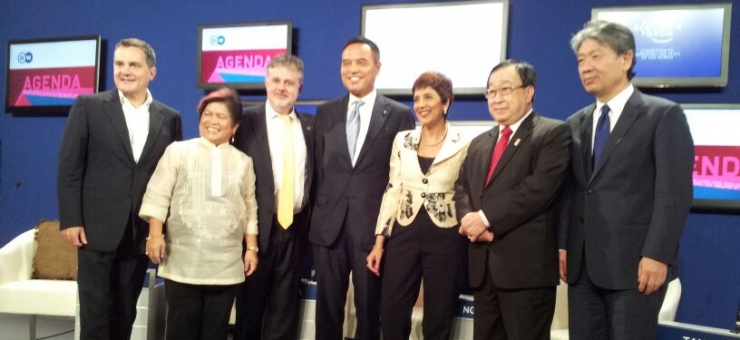UNI Apro and the quest for Equitable Employment

UNI Apro Regional Secretary, Christopher Ng sat as a panelist on the Panel Discussions on Equitable Employment at the World Economic Forum on East Asia held in Manila on the 23 May 2014. He emphasized the need for equitable employment and sustainable development and highlighted the importance of minimum wage in stablizing the economy and the society.
Christopher outlined the following proposals to resolved issues that have emerged as a result of globalisation:
a) We support the adoption and observance of universal standards of corporate behaviour. As outlined in the Ruggie Framework on business and human rights: it is the duty of corporations to respect labour and human rights, the State to protect these rights, and the collective duty of all stakeholders to find remedy in case of any violations.
b) Economic planning should focus on job creation, human resource development and skills training, and should promote coherence in social, economic, labour and environmental policies.
c) Public spending on social protection for all should be raised to a minimum of ten (10) per cent of the GDP. According to the ILO, governments should spend at least six % of the GDP to be able to provide universal social protection, especially on health and education. A decisive push on social protection means a decisive budgetary targeting for social protection.
d) Governments should recognize that the labour market under globalization has irrevocably been globalized. There is movement of workers of all skills and all categories across national boundaries, including movement of professionals and managers from the labour-receiving countries. Migrant workers of all categories and their families should enjoy all core labour and human rights.
e) One win-win formula in reducing precarity, poverty and inequality is to enhance the access of the poor not only to social protection but also to education/skills development and productive assets. The idea is to empower the poor by making them self-reliant and capable of participating in society’s wealth creation.
f) Finally, governments, employers and industry should recognize trade unions as partners, not adversaries, in the development process and at the work places. There should be genuine and meaningful social dialogue on how the architecture of collaboration can work for the benefit of everyone.
The other Panel members were: Christophe Duchatellier, CEO Asia Adecco Group, Corazon Juliano-Soliman, Secretary of Social Welfare and Development of the Philippines, Takeshi Ninami, Chairman, Lawson, Japan, Yoshiteru Uramoto, Assistant Director General, ILO Bangkok and Pierre Tami, Founder, Hager International. It was moderated by Amrita Cheema, Anchor Deutsche Welle TV Germany.
Please view the related file for his talking points.

